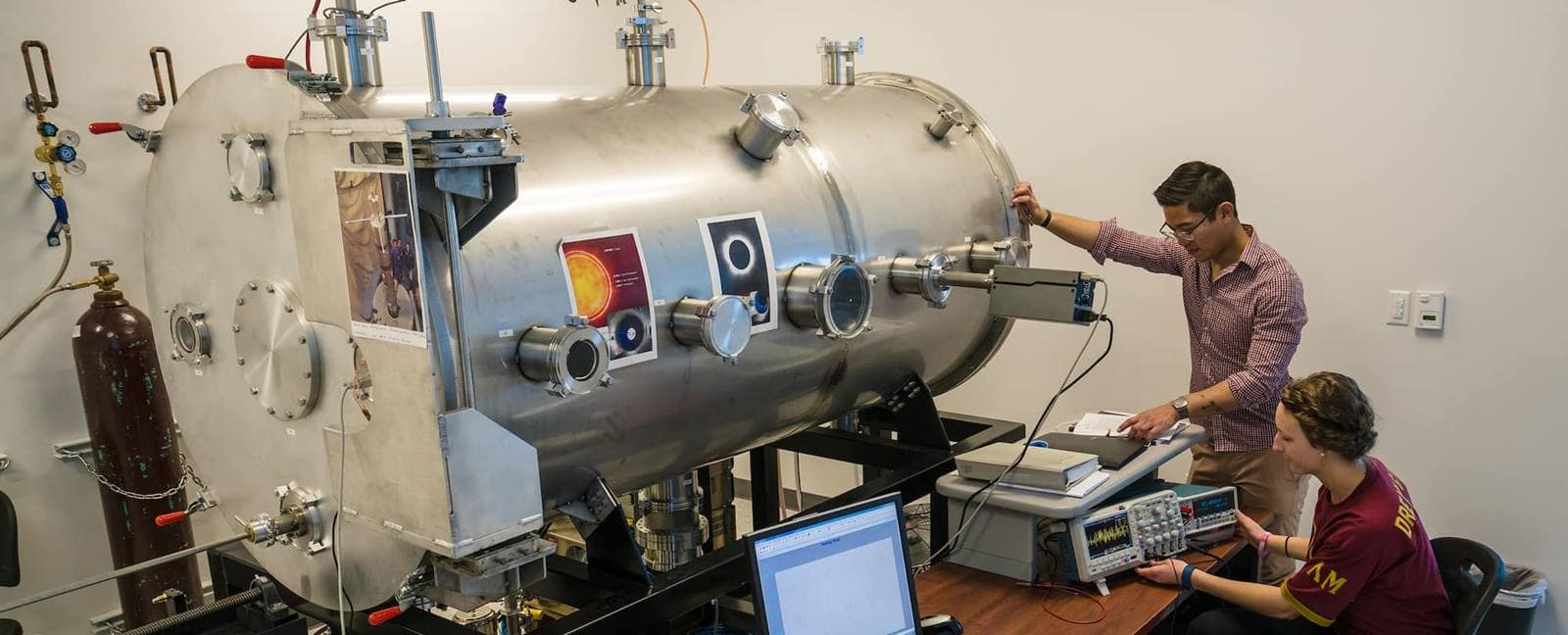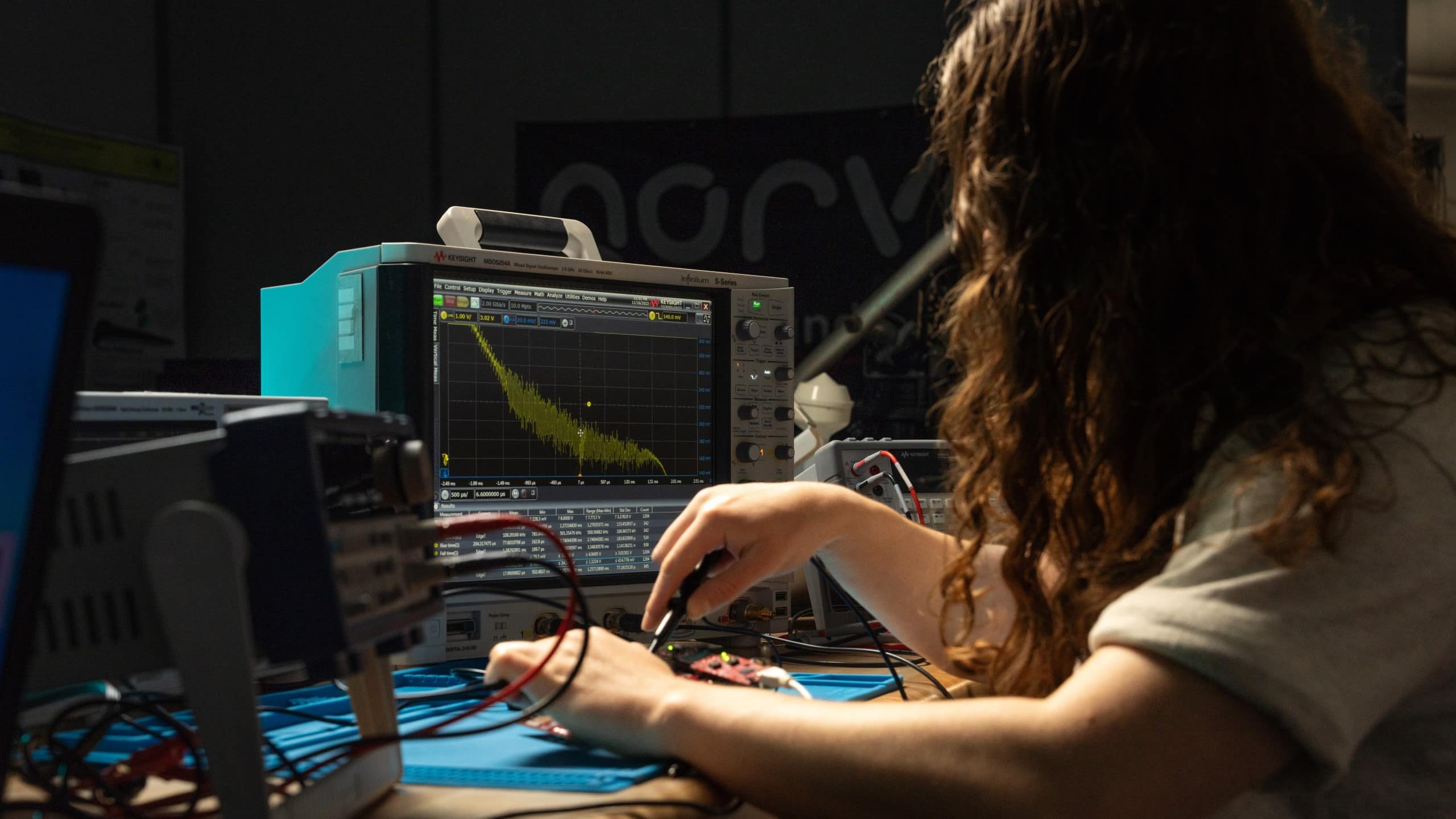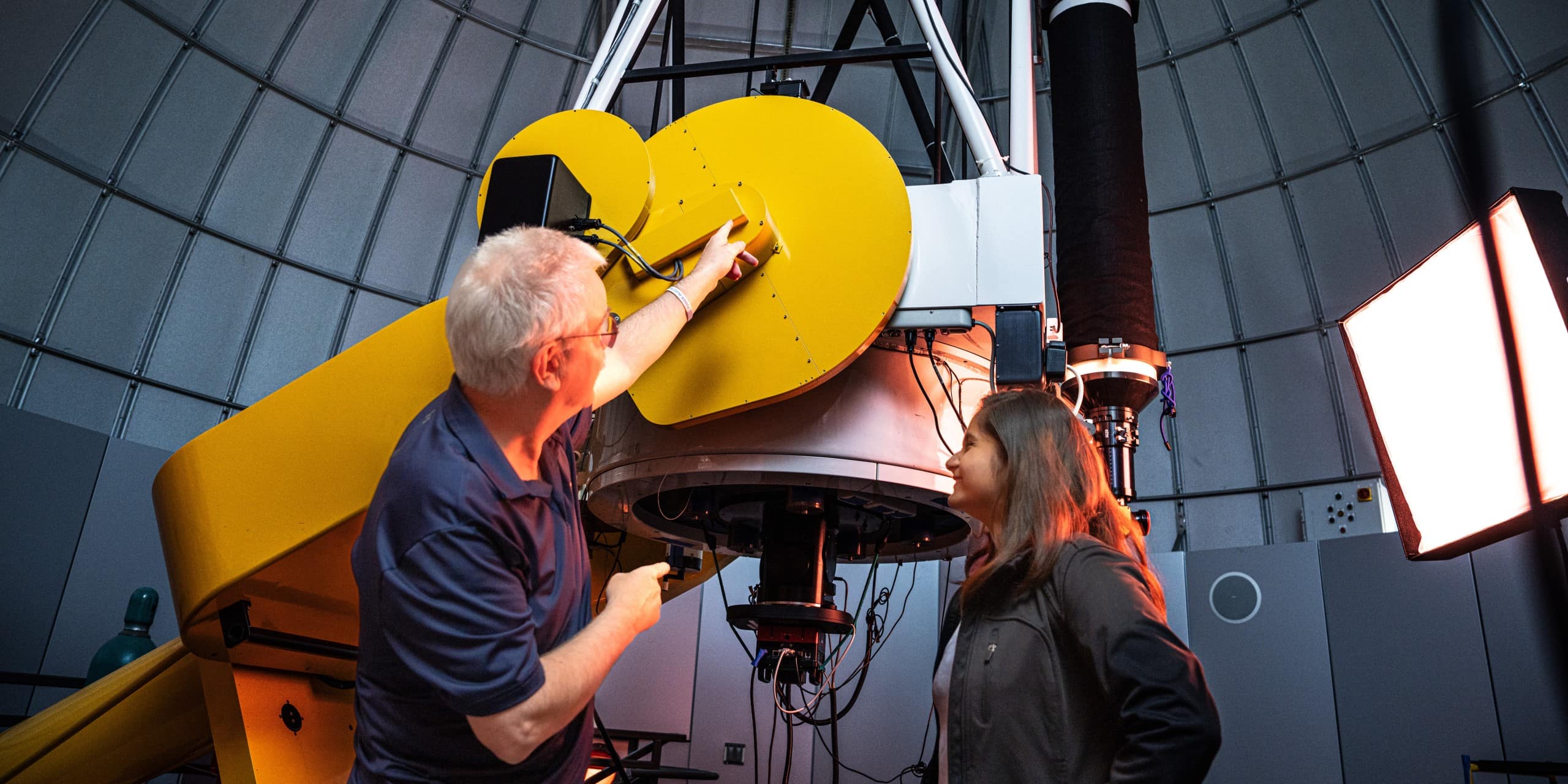
Bachelor of Science in
Engineering Physics
The B.S. in Engineering Physics focuses on engineering fundamentals while creating a gateway into the space program and a foundation for engineering careers.
About the Bachelor of Science in Engineering Physics
The Engineering Physics program emphasizes research, planning and instrumentation related to space exploration. In this program, you will have the opportunity to dive into everything from atmospheric physics to spacecraft control systems, learning how to design sensors and instruments that help unlock the mysteries of space.
The Engineering Physics degree at Embry-Riddle is one of the largest in the U.S. for this field, allowing you to have for more one-on-one time with professors and peers who share a passion for math, engineering, science and space. With a focus on space exploration, you’ll have the chance to get involved in exciting research in areas such as astrophysics, planetary sciences, spacecraft design and space weather.
Why You Should Study This Degree
Engineering physics uses principles of physics and mathematics to solve complex problems and develop new technologies in engineering. A degree focused on atmospheric physics may be for you if you enjoy:
- Applying math to real-world problems
- Designing innovative technologies
- Experimenting with physics concepts
- Programming and coding projects
- Solving complex puzzles and challenges
- Identify, formulate and solve complex engineering problems by applying principles of engineering, science and mathematics.
- Apply engineering design to produce solutions for specified needs with consideration of public health, safety and welfare, and global, cultural, social, environmental and economic factors.
- Communicate effectively with a range of audiences.
- Recognize ethical and professional responsibilities in engineering situations and make informed judgments.
- Have an ability to function effectively on a team whose members together provide leadership, create a collaborative and inclusive environment, establish goals, plan tasks and meet objectives.
- Develop and conduct appropriate experimentation, analyze and interpret data.
- Acquire and apply new knowledge as needed using appropriate learning strategies.
Engineering Physics Career Opportunities
Careers and Employers
Embry-Riddle Engineering Physics graduates are set to enter the workforce in roles such as:
- Physicists
- Project Engineers
- Launch Operations Specialists
- ISS Flight Controllers
Engineering Physics degree graduates tend to pursue higher education or enter the industry with organizations, including:
- The Boeing Company
- General Electric
- SpaceX
- United Space Alliance
- Various NASA Centers
Engineering Physics Salary Information
Graduates with a Bachelor of Science in Engineering Physics tend to receive competitive salaries, with an average income of $80,000 annually, as of 2022.
DETAILS
About Engineering Physics at the Daytona Beach, FL Campus
The Bachelor of Science in Engineering Physics provides you with the combined knowledge and skills of scientists and engineers. You will focus on scientific challenges and mission design related to space exploration, with a strong emphasis on engineering fundamentals. This creates opportunities for careers in engineering, applied physics and higher education.
The program includes an Engineering Physics Design Lab with high-processing engineering graphics workstations and state-of-the-art software. Additionally, the Atmospheric Physics Research Laboratory provides equipment for testing instruments and sensors in a chamber that closely replicates the vacuum of the space environment.
Embry‑Riddle also offers an accelerated degree program that allows you to complete both the bachelor’s and master’s degrees in Engineering Physics in five years. Learn more about this accelerated degree program.
Engineering Physics Information
- Credits:127
- Online or In-Person: In-Person
Professional Accreditation
The Bachelor of Science in Engineering Physics is accredited by the Engineering Accreditation Commission of ABET, under the commission’s General Criteria with no applicable program criteria.
Details about Program Educational Outcomes, Student Learning Outcomes and Enrollment Data can be found on our Engineering Physics Program Accreditation Information page.
Helpful Links
- Tour our Daytona Beach Campus
- Discover the College's Faculty
- Explore the Fields of Study: Applied Science, Space and Engineering
- Find Related Clubs & Organizations
Student Learning Outcomes
Students will:
- Have an ability to to identify, formulate, and solve complex engineering problems by applying principles of engineering, science, and mathematics.
- Have an ability to apply engineering design to produce solutions that meet specified needs with consideration of public health, safety, and welfare, as well as global, cultural, social, environmental, and economic factors.
- Have an ability to communicate effectively with a range of audiences.
- Have an ability to recognize ethical and professional responsibilities in engineering situations and make informed judgments, which must consider the impact of engineering solutions in global, economic, environmental, and societal contexts.
- Have an ability to function effectively on a team whose members together provide leadership, create a collaborative and inclusive environment, establish goals, plan tasks, and meet objectives.
- Have an ability to develop and conduct appropriate experimentation, analyze and interpret data, and use engineering judgment to draw conclusions.
- Have an ability to acquire and apply new knowledge as needed, using appropriate learning strategies.
General Education Requirements
For a full description of Embry-Riddle General Education guidelines, please see the General Education section of this catalog. These minimum requirements are applicable to all degree programs.
| Communication Theory & Skills | 9 | |
| Humanities - Lower level | 3 | |
| Social Sciences - Lower level | 3 | |
| Humanities or Social Sciences - Lower or Upper level | 3 | |
| Humanities or Social Sciences - Upper level | 3 | |
| Computer Science (CS 223) | 3 | |
| Mathematics (MA 241, MA 242) | 8 | |
| Physical and Life Sciences - one course must include a lab (PS 226, PS 226L. PS 227) | 7 | |
| Total Credits | 39 | |
Core Requirements
| Mathematics | ||
| MA 243 | Calculus and Analytical Geometry III | 4 |
| MA 345 | Differential Equations and Matrix Methods | 4 |
| MA 441 | Mathematical Methods for Engineering and Physics I | 3 |
| MA 442 | Mathematical Methods for Engineering and Physics II | 3 |
| Physical Science | ||
| CHM 110 | General Chemistry I | 3 |
| CHM 110L | General Chemistry I Laboratory | 1 |
| PS 228 | Physics III | 3 |
| PS 228L | Physics III Laboratory | 1 |
| PS 290 | Physics Laboratory Practicum | 0 |
| PS 303 | Modern Physics | 3 |
| PS 305 | Modern Physics Laboratory | 1 |
| PS 320 | Classical Mechanics | 3 |
| Engineering | ||
| EGR 120 | Graphical Communications | 3 |
| EP 101 | Current Topics in Space Science | 1 |
| EP 200 | Machine Shop Laboratory | 1 |
| EP 320 | Electro-Optical Engineering | 3 |
| EP 340 | Introduction to Space Systems Design | 2 |
| EP 391 | Microcomputers and Electronic Instrumentation | 3 |
| EP 391L | Microcomputer and Electronic Instrumentation Laboratory | 1 |
| EP 393 | Spaceflight Dynamics | 3 |
| EP 394 | Space Systems Engineering | 3 |
| EP 410 | Space Physics | 3 |
| EP 440 | Engineering Electricity and Magnetism | 3 |
| EP 455 | Quantum Mechanics | 3 |
| or EP 448 | Control System Theory and Engineering Applications | |
| EP 496 | Space Systems Design I | 3 |
| EP 497 | Space Systems Design II | 3 |
| Students Must Choose One AOC | ||
| Spacecraft Systems AOC | ||
| EE 327 | Electrical Engineering Fundamentals | 3 |
| ES 201 | Statics | 3 |
| ES 202 | Solid Mechanics | 3 |
| ES 204 | Dynamics | 3 |
| ES 309 | Fluid Dynamics | 3 |
| Engineering Electives * | 6 | |
| Spacecraft Instrumentation AOC | ||
| CEC 220 | Digital Circuit Design | 3 |
| CEC 222 | Digital Circuit Design Laboratory | 1 |
| CEC 315 | Signals and Systems | 3 |
| CEC 320 | Microprocessor Systems | 3 |
| CEC 322 | Microprocessor Systems Laboratory | 1 |
| CEC 410 | Digital Signal Processing | 3 |
| CEC 411 | Digital Signal Processing Laboratory | 1 |
| EP 430 | Spacecraft Instrumentation | 3 |
| Engineering Electives * | 3 | |
| Open Electives | 3 | |
| Total Credits | 88 | |
| Total Degree Credits | 127 | |
- *
Choose from AE/CEC/CIV/CS/EE/EGR/EP/ES/ME/SE/SYS 300-400 level courses.
Suggested Plan of Study - Spacecraft Systems Area of Concentration
| Year One | ||
|---|---|---|
| Credits | ||
| EP 101 | Current Topics in Space Science | 1 |
| EGR 120 | Graphical Communications | 3 |
| MA 241 | Calculus and Analytical Geometry I | 4 |
| MA 242 | Calculus and Analytical Geometry II | 4 |
| CHM 110 | General Chemistry I | 3 |
| CHM 110L | General Chemistry I Laboratory | 1 |
| Communication Theory and Skills * | 6 | |
| PS 226 | Physics I | 3 |
| PS 226L | Physics I Laboratory | 1 |
| HU Lower-Level Elective * | 3 | |
| SS Lower-Level Elective * | 3 | |
| Credits Subtotal | 32.0 | |
| Year Two | ||
| CS 223 | Scientific Programming in C | 3 |
| ES 201 | Statics | 3 |
| ES 202 | Solid Mechanics | 3 |
| ES 204 | Dynamics | 3 |
| MA 243 | Calculus and Analytical Geometry III | 4 |
| MA 345 | Differential Equations and Matrix Methods | 4 |
| Communication Theory and Skills * | 3 | |
| HU/SS Lower or Upper Elective * | 3 | |
| PS 227 | Physics II | 3 |
| PS 228 | Physics III | 3 |
| PS 228L | Physics III Laboratory | 1 |
| Credits Subtotal | 33.0 | |
| Year Three | ||
| EP 200 | Machine Shop Laboratory | 1 |
| EE 327 | Electrical Engineering Fundamentals | 3 |
| EP 340 | Introduction to Space Systems Design | 2 |
| EP 391 | Microcomputers and Electronic Instrumentation | 3 |
| EP 391L | Microcomputer and Electronic Instrumentation Laboratory | 1 |
| EP 393 | Spaceflight Dynamics | 3 |
| EP 394 | Space Systems Engineering | 3 |
| ES 309 | Fluid Dynamics | 3 |
| MA 441 | Mathematical Methods for Engineering and Physics I | 3 |
| MA 442 | Mathematical Methods for Engineering and Physics II | 3 |
| PS 303 | Modern Physics | 3 |
| PS 305 | Modern Physics Laboratory | 1 |
| PS 320 | Classical Mechanics | 3 |
| Credits Subtotal | 32.0 | |
| Year Four | ||
| EP 320 | Electro-Optical Engineering | 3 |
| EP 410 | Space Physics | 3 |
| EP 440 | Engineering Electricity and Magnetism | 3 |
| EP 455 | Quantum Mechanics | 3 |
or EP 448
|
Control System Theory and Engineering Applications | |
| EP 496 | Space Systems Design I | 3 |
| EP 497 | Space Systems Design II | 3 |
| Engineering Elective *** | 6 | |
| PS 290 | Physics Laboratory Practicum | 0 |
| HU/SS Upper-Level Elective * | 3 | |
| Open Electives | 3 | |
| Credits Subtotal | 30.0 | |
| Credits Total: | 127.0 | |
Suggested Plan of Study - Spacecraft Instrumentation Area of Concentration
| Year One | ||
|---|---|---|
| Credits | ||
| EP 101 | Current Topics in Space Science | 1 |
| EGR 120 | Graphical Communications | 3 |
| MA 241 | Calculus and Analytical Geometry I | 4 |
| MA 242 | Calculus and Analytical Geometry II | 4 |
| CHM 110 | General Chemistry I | 3 |
| CHM 110L | General Chemistry I Laboratory | 1 |
| Communication Theory and Skills * | 6 | |
| PS 226 | Physics I | 3 |
| PS 226L | Physics I Laboratory | 1 |
| HU Lower-Level Elective * | 3 | |
| SS Lower-Level Elective * | 3 | |
| Credits Subtotal | 32.0 | |
| Year Two | ||
| CEC 220 | Digital Circuit Design ** | 3 |
| CEC 222 | Digital Circuit Design Laboratory ** | 1 |
| CEC 315 | Signals and Systems ** | 3 |
| CEC 320 | Microprocessor Systems ** | 3 |
| CEC 322 | Microprocessor Systems Laboratory ** | 1 |
| CS 223 | Scientific Programming in C | 3 |
| EP 200 | Machine Shop Laboratory | 1 |
| MA 243 | Calculus and Analytical Geometry III | 4 |
| MA 345 | Differential Equations and Matrix Methods | 4 |
| Communication Theory and Skills * | 3 | |
| PS 227 | Physics II | 3 |
| PS 228 | Physics III | 3 |
| PS 228L | Physics III Laboratory | 1 |
| Credits Subtotal | 33.0 | |
| Year Three | ||
| EP 340 | Introduction to Space Systems Design | 2 |
| EP 391 | Microcomputers and Electronic Instrumentation | 3 |
| EP 391L | Microcomputer and Electronic Instrumentation Laboratory | 1 |
| EP 393 | Spaceflight Dynamics | 3 |
| EP 394 | Space Systems Engineering | 3 |
| MA 441 | Mathematical Methods for Engineering and Physics I | 3 |
| PS 303 | Modern Physics | 3 |
| PS 305 | Modern Physics Laboratory | 1 |
| PS 320 | Classical Mechanics | 3 |
| Engineering Elective *** | 3 | |
| HU/SS Lower or Upper Elective * | 3 | |
| Open Electives | 3 | |
| Credits Subtotal | 31.0 | |
| Year Four | ||
| CEC 410 | Digital Signal Processing ** | 3 |
| CEC 411 | Digital Signal Processing Laboratory ** | 1 |
| EP 320 | Electro-Optical Engineering | 3 |
| EP 410 | Space Physics | 3 |
| EP 430 | Spacecraft Instrumentation ** | 3 |
| EP 440 | Engineering Electricity and Magnetism | 3 |
| EP 455 | Quantum Mechanics | 3 |
or EP 448
|
Control System Theory and Engineering Applications | |
| EP 496 | Space Systems Design I | 3 |
| EP 497 | Space Systems Design II | 3 |
| MA 442 | Mathematical Methods for Engineering and Physics II | 3 |
| PS 290 | Physics Laboratory Practicum | 0 |
| HU/SS Upper-Level Elective * | 3 | |
| Credits Subtotal | 31.0 | |
| Credits Total: | 127.0 | |
- *
Any of the Embry-Riddle courses listed in the General Education Requirements list can be taken assuming prerequisite requirements are met. Courses from other institutions are acceptable if they fall into these broad categories and are at the level specified above in the Engineering Physics vertical outline.
- **
These are the courses that are different from those in the Space Systems Area of Concentration.
- ***
Any 3xx-4xx course with one of the following prefixes is an acceptable engineering elective: AE/CEC/CIV/CS/EE/EGR/EP/ES/ME/SE/SYS.
Get Started Now:
Summary
127 Credits
Estimate your tuition by using the Tuition Calculator
View Financial Aid Information
Learn about our General Education
Find out about transferring credits to this degree
Learn more about our Veterans & Military benefits
View our Academic Calendar




